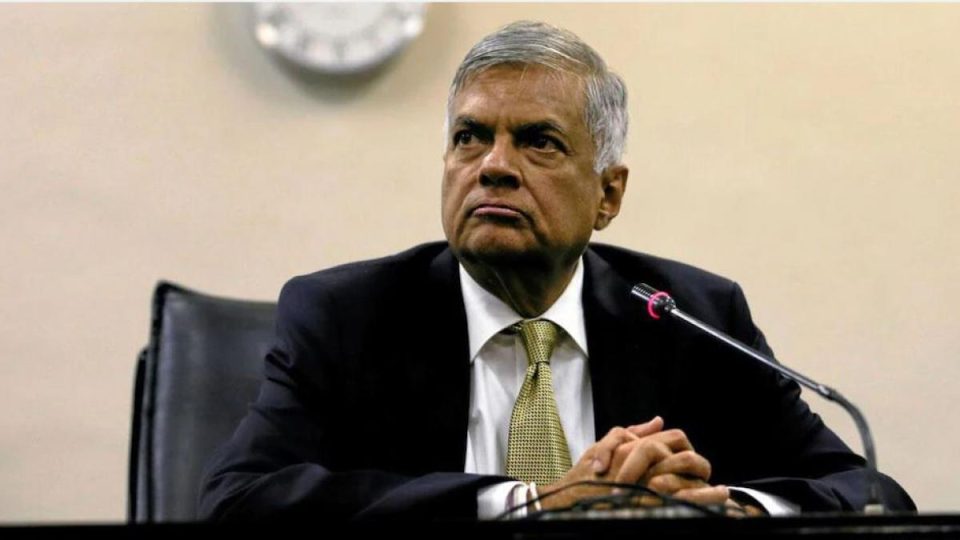
Ranil tipped to seek more Indian help for Sri Lanka’s recovery during Delhi visit

Sri Lankan President Ranil Wickremesinghe arrives in India later on Thursday (July 20) on a “very important” visit during which he is expected to discuss how New Delhi can extend further economic assistance to help his country come out of an ongoing crippling economic crisis.
Accompanying the president, considered an old friend of India, will be foreign minister Ali Sabry, power and energy minister Kanchana Wijesekara, fisheries minister Douglas Devananda and the chief of the president’s staff, Sagala Ratnayake.
“This is very important for us,” Sabry told the Daily Mirror in Colombo, referring to the overnight, two-day official trip to India, which Wickremesinghe will make exactly one year after he assumed the presidency following the dramatic ouster of his predecessor, Gotabaya Rajapakasa.
“The relationship with India is very, very important for us,” the foreign minister said. “They are the biggest players in the whole region, and their economy is growing faster than any other economy in the world…
“So, they are a huge opportunity for Sri Lanka to reap a lot of benefits from… They are ready to take off. So, we have to gain from engaging with India,” he added.
Also read: Illegal fishing by TN fishermen to figure in India-Sri Lanka talks: Douglas Devananda
Delhi meetings
Wickremesinghe will be meeting his Indian counterpart Droupadi Murmu and holding detailed talks with Indian Prime Minister Narendra Modi on Friday before heading home.
Fisheries minister Douglas Devananda told The Federal that the Sri Lanka-India discussions could cover the areas of investments and trade, renewable energy, oil pipeline, undersea cable, the health sector as well as the dairy industry.
The minister said he would also take up the rampant illegal poaching in Sri Lankan waters by what he described as a section of fishermen from Tamil Nadu who use bottom trawlers, destroying marine resources in the island’s north and seriously disrupting the lives of Tamil fishermen in his country.
Although there is a chorus in the north and east of Sri Lanka for early provincial council elections and the full implementation of the 13th amendment of the Constitution devolving powers to an elected local administration, it is unlikely that the issue will figure in any major way, if it all it does, when bilateral talks take place.
But the Indian government is alive to the Tamil sentiments around self-governance in the Tamil-majority northern province and also in the eastern province where Tamils are now in a majority in only one of three districts.
Also read: Tamil diaspora joins chorus, asks Modi to tell Ranil to hold provincial polls
Tamil MPs
Ahead of his India trip, Wickremesinghe told Tamils MPs in Colombo on Tuesday that he was ready to implement much of the 13th amendment, which flowed from the 1987 India-Sri Lanka accord, if he had support in the 225-seat parliament, dominated by members of the majority Sinhalese community.
Sri Lanka watchers believe that Wickremesinghe’s focus in India will be on how to speed up his country’s economic recovery from the depths it fell to last year, leading to mass protests that forced then president Gotabaya Rajapaksa to flee the island.
Although there have been halting progress on the economic front, with the tourism and hospitality industry beginning to stand on its legs again, Sri Lanka has a long way to go to wriggle out of the most crippling economic mess since independence in 1948.
Sri Lanka is saddled with more than $80 billion dollars of foreign and domestic debt, with foreign debt accounting for $36 billion. The International Monetary Fund’s $2.9 billion bailout has come as a huge relief but it has forced the government to do away with much of the subsidies that Sri Lankans were long used to and also widen the income tax bracket, both steps fueling public anger.
While the widespread shortages of fuel and food as well as prolonged power outages are more or less over, inflation is running very high, forcing numerous lower middleclass families to slip into the poverty bracket – in a country that was once considered an economic success story.
Faltering economy
Sri Lankan media reports say that almost half the families in the country now spend about 70 per cent of their income on food.
Since last year, India has provided $4 billion in financial aid. Economic ties have also been stepped up. The Adani group got a $442 million wind power project in Sri Lanka’s north. Also, Lanka IOC, a subsidiary of Indian Oil Corp, won 41 per cent stake to renovate 60 tanks in the Trincomalee oil storage facility. It will operate another 14 oil tanks.
According to Indian external affairs minister S Jaishankar, who as a diplomat was once posted in Colombo, India is strengthening cultural ties with Sri Lanka and also expanding connectivity by sea and air, particularly between Jaffna in the island’s north and Tamil Nadu, which are separated by a strip of sea.
Sri Lanka also knows that it has to tread carefully between India and China, which accounts for $7 billion of the country’s foreign debt. Unlike the ousted Rajapaksa, Wickremesinghe is not overtly pro-China. All this will be in his mind when the Sri Lankan president meets the Indian prime minister on Friday.


